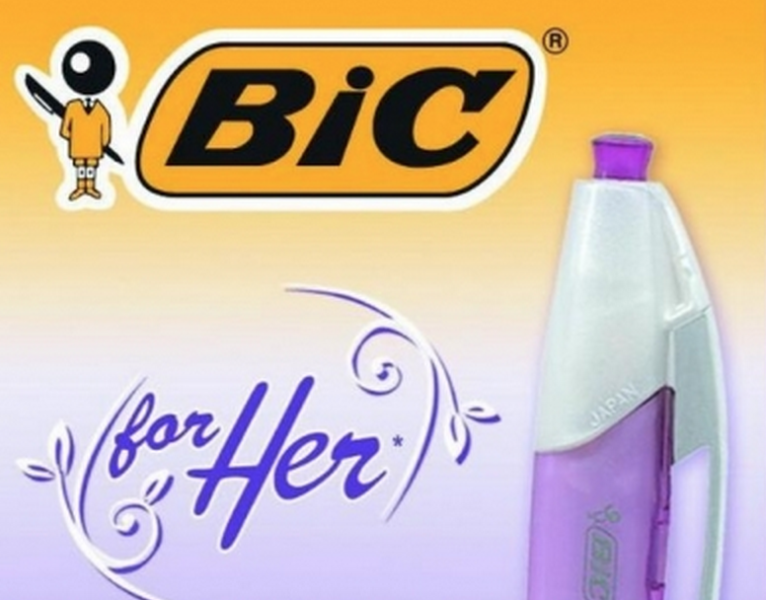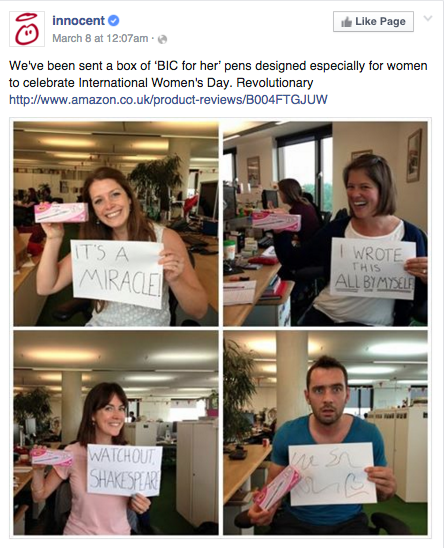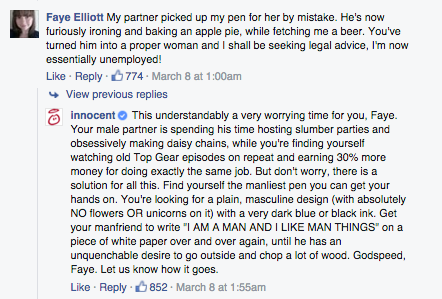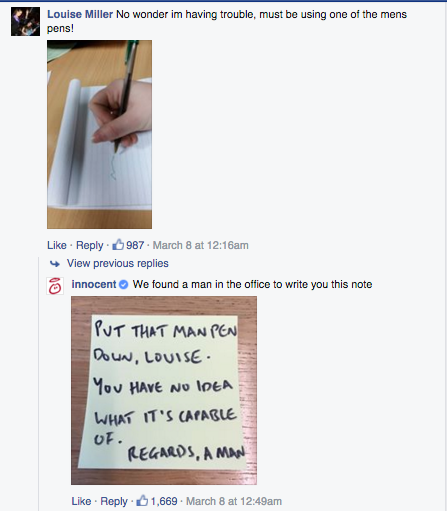This Facebook Post Hilariously Nailed the Absurdity of Bic's Pens 'for Her'

By:
A group of British women have sent a hilarious message to Bic about their sexist marketing, using Bic's 'For Her' pens to make a point.
Bic sent a package of their lady-centric pens — which were created in 2011 — to the offices of British drink company Innocent on Tuesday, in celebration of International Women's Day.
 Bic
Bic
Some employees responded with a priceless Facebook photo, which quickly went viral.
 facebook/innocent.drinks - facebook.com
facebook/innocent.drinks - facebook.com
The post shows gleeful women holding up the pink Bic boxes along with tongue-in-cheek signs celebrating their newfound writing abilities. "IT'S A MIRACLE!" one declares, while another boasts, "WATCH OUT SHAKESPEARE." A befuddled male employee is left sadly unable to write legibly with the women-centric implement. Facebook commenters joined in the fun and posted their own sarcastic takes:
 facebook/innocent.drinks - facebook.com
facebook/innocent.drinks - facebook.com
 facebook/innocent.drinks - facebook.com
facebook/innocent.drinks - facebook.com
Innocent's official Facebook page jumped in, replying to comments and pointing out other preposterous sexist stereotypes.
 facebook/innocent.drinks - facebook.com
facebook/innocent.drinks - facebook.com
 facebook/innocent.drinks - facebook.com
facebook/innocent.drinks - facebook.com
The Bic 'For Her' backlash
As ATTN: has previously reported, Ellen DeGeneres riffed on the outlandish pens in a 2012 segment. "Can you believe this? We've been using man pens all these years ... Designed to fit a woman's hand. What does that mean?" DeGeneres cleverly used the pens to tackle other dated stereotypes about women in the workplace and referenced the gender pay gap that still impacts women to this day.
"So when we're taking down dictation from our bosses, we'll feel comfortable, and we'll forget we're not getting paid as much?" she asked.
Bic's branding earned more than a bit of snark from product reviewers and journalists, but, as Forbes pointed out, the company probably didn't intend to make a sexist statement. Bic likely created the pens upon observing that their customers were primarily male, Forbes contributor David Vinjamuri observed. "It’s what happens when you try to build your brand by looking at it through the lens of data rather than from the perspective of your consumer," Vinjamuri wrote.
Despite massive media backlash, Bic continued to market the pens, which allegedly sold well according to the company's statements in a 2012 piece in the UK Telegraph.
Marketers pander to women, and it isn't pretty.
As ATTN: has previously reported, companies often attempt to cash in on perceived gender-specific gaps in the market. When companies market products, they typically attempt to identify and narrow needs or wants that have not been met by existing products. Luna Bars were the first nutrition bars marketed to women specifically, according to Racked, and are a good example of how gender can factor into the marketing equation.
Unlike carbohydrate heavy nutrition bars designed for men looking to fuel up and hit the gym, the ingredients and packaging of Luna Bars cater to women who exercise casually and want to avoid weight gain. Special K and Lean Cuisine also use this trope, repackaging the contents and aesthetics of cereal and frozen food for women who wish to eat healthy and conveniently. These products may not have received as much backlash as Bic 'For Her' because women actually wanted or needed healthy and convenient snack options—or the marketing was good enough to convince them that was the case.
The firearms industry has also recently gone after women as potential customers, using stereotypical feminine color schemes (make it pink!), bra holsters, and Hello Kitty prints.
Beyond the subjectively unsavory nature of gendered marketing, some companies and industries have come under fire for charging more for female products than virtually identical male ones. The New York City Department of Consumer Affairs surveyed over 90 brands and nearly 800 products sold throughout the city and online in December 2015 and found that women's products cost an average of 7 percent more than men's 42 percent of the time. The phenomenon became known as "the pink tax."
Bic's initial line of pens 'For Her' cost 70 percent more than similar pens sold by the company in 2012, Jezebel reported.
